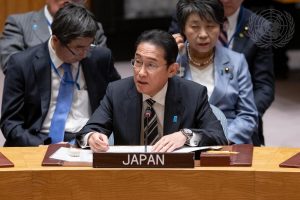Japan’s G-7 presidency was set against the volatile backdrop of the continuing Russian invasion of Ukraine, which spurred many of its peers and trading partners to accelerate their clean energy transitions to improve energy security. Throughout the year, extreme weather events have continued to break records, heightening global awareness of the devastating impact of climate change. In this context, Japan had the opportunity to establish its credentials as a progressive leader in global climate and energy diplomacy, and simultaneously future-proof its economy by joining its G-7 peers in a stronger push for clean energy leadership.
So far, that opportunity remains unused. However, Japan can still contribute as a climate and energy leader at COP28.
Historically, climate leadership has not been a strong area for Japan. While the country has received praise for its contribution to the Sustainable Development Goals on global health, it has failed to impress on advancing the transition to a decarbonized power system. Japan is widely seen to lag behind its G-7 peers in this essential area for climate mitigation.
Japan’s unambitious stance showed in the outcomes of its G-7 Summit. Rather than build on the progress on energy issues from prior G-7 summits, its presidency led the group to weaken a commitment to end public financial support for gas investments. Japan also drew criticism as the only G-7 member advocating for technologies such as co-firing coal with ammonia, which risks prolonging the lifespan of coal plants (seemingly to the benefit of Japanese vested interests), in direct contradiction of the global scientific imperative of phasing out coal power.
Japan’s unwillingness to support more ambitious targets reflects the country’s insufficient progress in implementing its own existing commitments. A recent report from BloombergNEF warned that Japan may fall short of meeting its emission reduction targets for 2030 and 2050 unless major revisions are made to its energy policies.
Overseas, Japan has delivered on its prior G-7 commitment to end public financing of new, conventional coal power plants. However, it’s a different story regarding its support for fossil fuel technologies like ammonia co-firing, which Japan is heavily marketing in Southeast Asia and beyond. Aside from slowing down the global phase out of coal, these technologies are experimental and unlikely to help countries cut emissions or improve energy self-sufficiency. In addition, climate campaigners have raised serious concerns about Japan’s promotion of LNG.
These criticisms may have blocked Japan from gaining entry to key climate diplomacy events. Nikkei reported sources saying that Prime Minister Kishida Fumio was not welcomed to the U.N. Climate Ambition Summit in September because Japan was unable to demonstrate convincing enough progress on its climate policies to earn a speaker spot.
Some in Japan lament that its strategy is not well understood overseas. However, Japanese decisionmakers should recognize that decades of talk about “cleaner fossil fuels” have led to insignificant results. The unwillingness to reform its transition strategy despite changed economic and climate realities is now eroding Japan’s attractiveness as a clean energy partner.
On the other hand, when Japan can be convinced by more ambitious G-7 partners to improve energy goals, major positive developments can be unlocked. This year the G-7 agreed for the first time that it would work toward ending the construction of new unabated coal power plants nationally and cooperate with other countries to achieve the goal globally. The G-7 also set out goals for renewables deployment and for accelerating the phaseout of unabated fossil fuels by 2050. These commitments have contributed to growing momentum for a global goal to triple renewables capacity and double energy efficiency improvements by 2030, to be agreed at COP28, hosted by the United Arab Emirates. The United States, European Union, and G-20 are already behind these targets.
As its G-7 presidency concludes, Japan has an opportunity to advance delivery of the global clean energy transition. This includes championing an ambitious energy package – and its implementation – in the negotiated COP text. For example, with Japan’s strong track record in energy efficiency, numerous avenues exist for the country to assume diplomatic and trade leadership.
By proactively supporting the renewables and efficiency targets alongside the phase out of fossil fuels at COP28, and embedding these goals in its domestic agenda, Japan could close its G-7 year on a positive note. Kishida could thereby ensure his 2023 G-7 presidency legacy is remembered for advancing international energy diplomacy at a critical time for climate action.

































